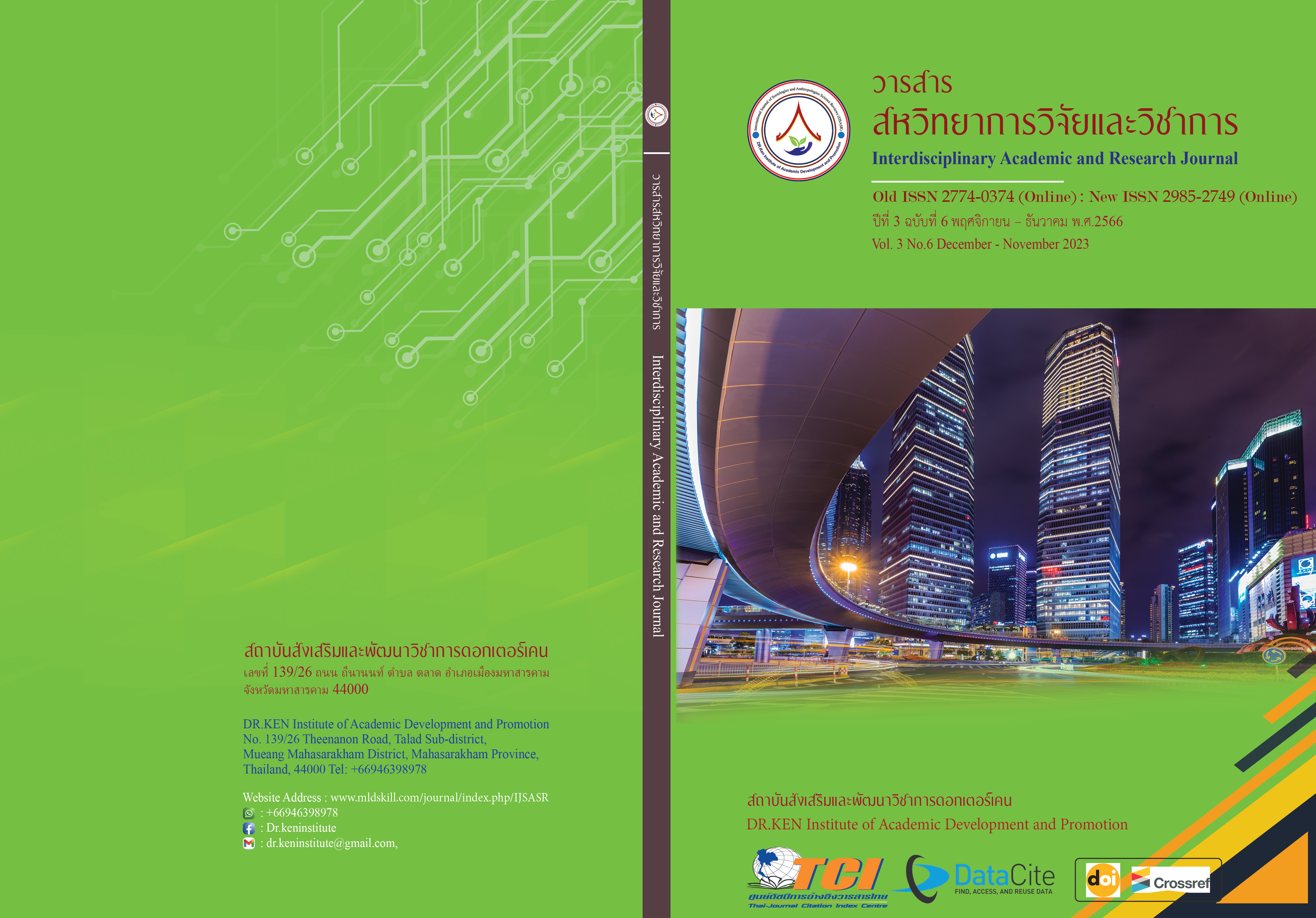Evaluation for the Camp Leadership Training Program for Undergraduate Students, Ramkhamheang University: Application of the Utilization-Focused Evaluation Model
DOI:
https://doi.org/10.60027/iarj.2023.272557Keywords:
Utilization-Focused Evaluation; , Training Program; , Camp LeadershipAbstract
Background and Aims: The camp leadership training program aims to develop students to understand camp leadership as well as develop intelligence, emotions, society, unity, discipline, and kindness among the group and develop teaching and learning activities to generate students a variety of experiences. This research aimed to (1) investigate the requirements for evaluating the camp leadership training program from evaluation users’ perspective and (2) assess the camp leadership training program based on the users’ evaluation needs.
Methodology: The study was quantitative research, which procedure consist of two phases. In Phase 1, “Study of Requirements for Evaluating the Camp Leadership Training Program from the Users’ Perspective”, key informants comprised three teachers responsible for the project, three trainers, and four student camp leaders, making a total of 10 participants. Data were collected through a questionnaire with a 3-point scale and analyzed using descriptive statistics, including frequency, percentage, and mode. In Phase 2, “Evaluation of the Camp Leadership Training Program Based on Users’ Needs”, the target group consisted of the same three teachers, three trainers, and four student leaders, but also included 45 camp resident students, amounting to 55 participants in total. Data were collected using a questionnaire with a 5-point scale and analyzed using descriptive statistics, such as the mean and standard deviation.
Results: 1) Three main areas emerged in the camp leadership training program from the users’ perspective: (1) input factors, including supporting resources, participant qualifications, and location; (2) process, which refers to the appropriateness of activities conducted on days 1, 2, and 3; (3) program outcomes, which refers to the benefits derived from the activities conducted on days 1, 2, and 3 and provides an overarching perspective. And 2) The evaluation results of the camp leadership training program based on the needs of the evaluation users were mostly positive with overall satisfaction. Further categorization revealed that (1) for input factors, satisfaction was at a high level, (2) for process, satisfaction was at the highest level, and for program outcomes, satisfaction was at the highest level.
Conclusion: The research highlights the critical assessment dimensions for leadership training programs at residential camps, emphasizing input, process, and outcome factors. Overall, the program receives the highest level of user satisfaction across these dimensions, affirming its effectiveness and positive impact on participants.
References
กมลชนก รักษาวงศ์และวิมล หอมยิ่ง. (2560). ประสิทธิผลของโครงการฝึกอบรมด้านการอนุรักษ์พลังงานและสิ่งแวดล้อมอุทยานสิ่งแวดล้อมนานาชาติสิรินธร อำเภอชะอำ จังหวัดเพชรบุรี. Veridian E-Journal, 10(2), 205-219.
กรฎา มาตยากรม, สุเมธ พรหมอินทร์ และนพดล นิ่มสุวรรณ. (2563). การประเมินประสิทธิภาพโครงการฝึกภาคสนามการอยู่ค่ายพักแรมมหาวิทยาลัยสงขลานครินทร์ วิทยาเขตหาดใหญ่. วารสารศึกษาศาสตร์ มหาวิทยาลัยสงขลานครินทร์ วิทยาเขตปัตตานี, 31(2),181-191.
คณะกรรมการการอุดมศึกษา. (2552). ประกาศคณะกรรมการการอุดมศึกษา เรื่อง แนวทางการปฏิบัติตามกรอบมาตรฐานคุณวุฒิระดับอุดมศึกษาแห่งชาติ พ.ศ.2552. คณะกรรมการการอุดมศึกษา.
รักษิต สุทธิพงษ์. (2564). ผลการจัดการเรียนรู้ตามกระบวนการคิดเชิงออกแบบในรายวิชาการอยู่ค่ายพักแรมที่มีต่อผลการเรียนรู้ด้านทักษะความสัมพันธ์และความรับผิดชอบของนิสิตคณะศึกษาศาสตร์ มหาวิทยาลัยนเรศวร. วารสารศึกษาศาสตร์ มหาวิทยาลัยทักษิณ, 22(1), 122-135.
ฤกษ์รัตน์ ปักกันต์ธร. (2556). การประเมินโดยมุ่งเน้นผู้ใช้ประโยชน์: กรอบคิดและแนวทาง. วารสารบริหารธุรกิจ เศรษฐศาสตร์และการสื่อสาร, 8(2), 31-43.
วรพงษ์ แย้มงามเหลือ. (2547). การประเมินกิจกรรมการอยู่ค่ายพักแรมและการศึกษาอกสถานที่นิสิตสาขาวิชาพลศึกษา มหาวิทยาลัยเกษตรศาสตร์. วารสารศึกษาศาสตร์ปริทัศน์, 19(2), 51-57.
ศักดิพันธ์ ตันวิมลรัตน์. (2546). เทคนิคและวิธีการจัดกิจกรรมกลุ่มสัมพันธ์. วารสารวิทยบริการ, 14(1), 40-55.
สมควร โพธ์ิทอง. (2552). การประเมินผลกระบวนการจดการเรียนรู้วิชาการอยู่ค่ายพักแรม. วารสารคณะพลศึกษา, 14(1), 1-16.
สำนักงานคณะกรรมการการอุดมศึกษา. (2560). เกณฑ์มาตรฐานหลักสูตรระดับอุดมศึกษา พ.ศ.2558 และเกณฑ์มาตรฐานที่เกี่ยวข้อง. บริษัท วงศ์สว่างพับลิชชิ่ง แอนด์ พริ้นติ้ง จำกัด.
สุปราณี หมื่นยา. (2561). การประเมินแบบมุ่งเน้นการใช้ประโยชน์: ทฤษฎีสู่การปฏิบัติ. วารสารวิทยาลัยพยาบาลบรมราชชนนี อุตรดิตถ,10(2), 260-271.
Chimed, B., Zaveri, S., & Batchuluun, B. (2011). Utilization-Focused Evaluation for Development Research to Empower All Mongolians through Information Communications Technology.
İlerten, F., & Efeoglu, G. (2021). Utilization focused evaluation of an ELT prep program: A longitudinal approach. Pegem Journal of Education and Instruction, 11(2), 27–31. https://doi.org/10.14527/pegegog.2021.03
Patton, M.Q. (2012). Essentials of utilization-focused evaluation. London: Sage Publication, Inc.
Stufflebeam D.L., & Shinkfield A.J. (2007). Evaluation theory, models & applications. San Francisco: Jossey-Bass.
Whittington, A., & Garst, B.A. (2018). The Role of Camp in Shaping College Readiness and Building a Pathway to the Future for Camp Alumni. Journal of Youth Development, 13 (1-2), 105-125.
Downloads
Published
How to Cite
Issue
Section
License
Copyright (c) 2023 Kritchaya Poompin, Chuthaphon Masantiah, Wanatphong Benjaphong

This work is licensed under a Creative Commons Attribution-NonCommercial-NoDerivatives 4.0 International License.
Copyright on any article in the Interdisciplinary Academic and Research Journal is retained by the author(s) under the under the Creative Commons Attribution-NonCommercial-NoDerivatives 4.0 International License. Permission to use text, content, images, etc. of publication. Any user to read, download, copy, distribute, print, search, or link to the full texts of articles, crawl them for indexing, pass them as data to software, or use them for any other lawful purpose. But do not use it for commercial use or with the intent to benefit any business.
















.png)


